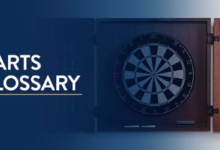Popular Dart Slang You’ll Hear in the Game

If you’ve ever played or watched darts, you’ve probably come across some unique dart slang that can be confusing at first. From playful nicknames for scores to terms describing specific shots, understanding this lingo helps you follow the game and join in on the fun. In this article, “Popular Dart Slang You’ll Hear in the Game,” we’ll break down the most common dart slang and explain what each term means for players of all levels.
Why Dart Slang Exists
Dart slang exists to make the game more fun, social, and connected to its history. Many of these terms originated in early 20th-century British pubs, where working-class players created colorful expressions inspired by Cockney rhymes and fairground talk. For example, “Euston Road” means two fours, “Lord Nelson” represents a score of 111, and “bed and breakfast” refers to scoring 26 points in a round.
Slang helps players talk quickly during games. Terms like “Big Fish” for a 170 checkout or “Shanghai” for hitting a single, double, and triple of the same number let players communicate clearly. Besides being useful, it builds a sense of community and preserves long-standing traditions alive, giving darts their special character.
Playful expressions such as “bag of nails” (three ones) or “Robin Hood” (a dart stuck in another dart) add humor and personality to the game. Dart slang makes the game easier to follow, brings players together, preserves its history, and keeps the lively, fun spirit of darts alive.
Popular Dart Slang Terms
Here’s a detailed guide to popular dart slang, with context and examples to help you understand each term:
- Score-Related Slang
- Ton / Ton-80: A “Ton” is scoring 100 points in a single turn (three darts), while a “Ton-80” is the highest possible score—three triple 20s for 180 points. These terms are widely used in commentary to highlight impressive scoring.
- Shanghai: Hitting a single, double, and triple of the same number in one turn. It’s a rare and skillful achievement.
- Bust: Occurs when a player scores more than the points needed to finish a leg. The turn is “bust,” and the score resets to the previous total. This requires careful planning and strategy.
- Checkout / Finish: The exact score needed to win a leg. For example, with 40 points remaining, hitting a double 20 completes the checkout. Knowing common checkouts is essential for winning efficiently.
- Shot-Specific Terms
- Triple: The thin inner ring of a number, multiplying its value by three. A triple 20 scores 60 points.
- Double: The thin outer ring, doubling the number’s value. Many legs can only be finished by hitting a double.
- Bull / Bullseye: The center of the board. Inner bullseye = 50 points; outer bullseye = 25 points. Crucial for high-scoring checkouts.
- Robin Hood: When a dart sticks into the back of another already on the board. It looks impressive, but it may not always count for points.
- High Ton / Low Ton: Informal scoring descriptions. A high ton is a score close to 180, and a low ton is around 100. Commentators use these terms to highlight performance.
- Fun & Quirky Nicknames
- Monkey: Scoring 111 points in a turn, often mentioned humorously.
- Big Fish: The highest possible three-dart score to finish a leg, totaling 170 points.
- Bed / Bed of Nails: Hitting the same number consistently, demonstrating accuracy and control.
- Walkaway / Hit the Road: Finishing a leg quickly, usually with a high-scoring checkout, showing skill and efficiency.
- Hitting the Spot / Pocket: Accurately targeting a specific segment on the board is important for checkouts or scoring high points.
- Gameplay & Match Terms
- Leg: A single game within a match. Matches usually consist of multiple legs.
- Set: A collection of legs; winning sets may be required to win the match in tournament formats.
- Marker: The person who keeps score, often a friend, referee, or another player.
- Pace / Rhythm: The speed and consistency of a player’s throws. Maintaining a good pace helps focus and keeps the scoring momentum.
Understanding these terms makes darts more engaging and easier to follow. Beginners can learn scoring, strategies, and targets, while experienced players can communicate efficiently, enjoy the game’s culture, and appreciate its humor and traditions.
Tips for Learning Dart Slang
Learning darts slang can make the game more fun and help you understand what’s happening during play. Here’s how to get started:
- Study Glossaries
Check out lists of dart terms to learn what they mean. Glossaries explain scoring phrases like “Ton-80” and fun nicknames like “Monkey.” Learning these terms helps you understand them when you hear them in games, commentary, or conversations with other players.
- Watch Matches and Commentary
Watching professional darts shows how slang is used in real situations. Listen for words like “checkout,” “Shanghai,” or “Robin Hood” to see what they mean on the board. This helps you connect the terms to real actions and remember them better.
- Join Online Communities
Participate in forums and social media groups to see how other players use dart slang. You can ask questions, learn local or regional expressions, and get tips from experienced players. Engaging with the community helps you practice and understand the language of darts in real-life situations.
- Practice Using the Terms
Try saying the slang during practice or casual games. For example, call a 170 checkout a “Big Fish” or a single-double-triple turn a “Shanghai.” Using the terms yourself helps you remember them and makes learning more fun.
By studying, watching, joining communities, and practicing, you’ll become comfortable with darts slang. This will make games more enjoyable, help you talk with other players, and give you a better sense of the culture, strategy, and humor of darts.
Using Dart Slang Like a Pro
Mastering dart slang isn’t just about sounding like a pro, it’s about understanding the culture and flow of the game. Here’s how to learn the language of darts and use it confidently:
- Learn the Core Slang
Start with the essentials:
- Arrows: Slang for darts.
- Ton / Ton-80: Scoring 100 or 180 points in a single turn.
- Shanghai: Hitting a single, double, and triple of the same number in one turn.
- Big Fish: Scoring exactly 170 points in one turn by hitting triple 20 and the bullseye.
- Bust: Scoring more points than needed, causing the score to reset.
- Leg: A single game within a match.
- Oche: The line from behind which players throw.
For a full list, check out Dart Corner’s glossary.
- Watch and Listen to Professionals
Watch professional darts matches and focus on how commentators talk about the game. Hearing these terms in real games helps you understand what they mean and how they are used, making it easier to learn and remember the slang.
- Practice with Other Players
Play with friends or join local leagues to practice using slang. Engaging with other players helps reinforce your understanding and makes learning more fun.
- Use Slang in Conversations
Start using dart slang when talking about the game with friends or fellow players. For example, instead of saying “I scored 100 points,” you can say “I scored a ton.” The more you use these terms in everyday conversation, the more natural they will feel, helping you remember them and speak like a real darts player.
- Keep a Personal Dart Dictionary
Create your own glossary of terms. Add new words with their meaning and an example. This makes it easy to review and helps you remember what you learn.
By practicing these steps and immersing yourself in the language of darts, you’ll not only speak like a pro but also gain a deeper appreciation for the sport’s culture, history, and fun.






